This article was co-authored by Jacqueline Hellyer. Jacqueline Hellyer is a Licensed Psychosexual Therapist and the Founder of The Love Life Blog and The LoveLife Clinic. With over 20 years of experience, Jacqueline specializes in sex advice, sex tips, and relationship advice. In addition to being an accredited Psychosexual Therapist with the Society of Australian Sexologists (SAS), Jacqueline is also a Professional Certified Coach with the International Coach Federation (ICF). Jacqueline holds a BSc in Biochemistry and Human Sciences from The Australian National University, a Graduate Diploma in Applied Science from the University of Canberra, a BA in Languages and Literature from the University of New England (AU), an MSc in Sexual Health from The University of Sydney, and an MSc in Consciousness, Spirituality & Transpersonal Psychology from The Alef Trust. Her work and expertise have been featured in Australian Men’s Health, Cosmopolitan, Australian Women’s Health, Marie Claire, and 60 Minutes.
There are 10 references cited in this article, which can be found at the bottom of the page.
This article has been viewed 23,915 times.
The COVID-19 pandemic has left us with more questions than answers, especially when it comes to physical touch and intimacy. Don’t worry! A lot of people share the same worries and concerns. Scroll through this guide and see if it answers some of your questions—during COVID-19, knowledge is one of the best ways you can stay protected.
Steps
Can I have sex with someone during COVID-19?
-
1Having sex with a live-in partner doesn’t put you at a higher risk. Unfortunately, there are no guarantees when it comes to COVID-19. However, if you already live with your partner, spend time with them daily, and share meals and such, being intimate probably doesn't increase your chances of being exposed to the virus. Plus, you don’t have to worry as much if you’re both practicing social distancing from people who live outside of your home and taking other precautions to prevent getting sick.[1]
- Some people may have COVID-19 asymptomatically, or without showing any symptoms. Keep this in mind if you choose to get intimate.[2]
-
2Use your own discretion if you don’t live with your partner. Aside from masturbation, your safest bet is having sex with a live-in partner. If you’re not in a committed relationship, choose your partners carefully. Ideally, choose sexual partners that you trust and know well, instead of strangers.[3]
- Communicate with your partner and ask how they’re feeling, and if they’ve had any symptoms within the past 2 weeks.[4] It may seem silly, but you’ll be doing yourself a favor in the long run.
How can I protect myself and my partner?
-
1Abstinence is the best way to protect both yourself and your partner. Medical experts agree that social distancing, or standing 6 ft (1.8 m) away from the people around you, is the best, most effective way to stop the spread of COVID-19. Unfortunately, you can’t stay 6 ft (1.8 m) away from someone when you’re having sex.[5]
-
2
-
3Try to avoid sharing bodily fluids, like spit, feces, urine, or semen. To stay extra clean, hop in the shower and wash your hands before and after you have sex. On a similar note, scrub your favorite toys with soap and water before and after playing with them, so you don’t risk spreading any germs to yourself and your partner.[9]
- Some people like to clean off with alcohol wipes or soap after they’ve been intimate.
-
4Use dental dams if you’re having oral sex. Dental dams cover your anus and the entrance to your vagina, and protect you and your partner from sharing too many bodily fluids or germs. Unwrap the dental dam from the package and rub a thin layer of water-based lubricant on 1 side of the material. Stick the lubed side of the dental dam to your (or your partner’s) entrance before getting intimate, which will protect you both from passing germs to one another.[10]
- If you and your partner choose to have oral sex, pick up a set of dental dams online or from the store so you can stay protected.
-
5Don’t have sex if you or your partner feels under the weather. Stay up-to-date on some of the usual COVID-19 symptoms, like fatigue, persistent cough, fever, aches muscles, headaches, chills, difficulty breathing, and more.[11] Ask your partner how they’re feeling before you start getting intimate—if either of you aren’t feeling great, hold off on having sex.[12]
- This applies to anyone you’re having sex with, whether it’s a long-term partner or something a little more casual.
Is COVID-19 sexually transmitted?
-
1COVID-19 is a respiratory illness, not an STD. Studies have found COVID-19 in semen, but there isn’t any definite evidence that the virus can be passed to a partner during sex. As of October 2020, medical professionals haven’t found the virus in any vaginal fluids, either.
-
2You can still get COVID-19 from sex if your partner has the virus. COVID-19 is spread through respiratory droplets like coughs, sneezes, snot, spit, and breathing out. When you’re intimate, there’s a very good chance that you’ll be swapping spit with your partner, especially if you’re kissing, biting, or doing something similar.
- Studies show that COVID-19 can be spread through fecal matter, which can be a problem if you and your partner enjoy certain types of oral sex.
- Used sex toys can also spread germs if they aren’t washed between uses.
How can I have a sex life when I’m quarantined?
-
1Masturbate on your own time.[13] Wash your hands thoroughly with soap and warm water, and then pleasure yourself to your heart’s content. As long as your hands are clean, you won’t be giving yourself any new germs.[14] Sex toys are also a great masturbation option, as long as you wash them with soap and warm water before and after you play with them.[15]
-
2Talk to your partner about having a virtual sex life. It’s not the same as meeting in person, but sexy text messages, pictures, and videos can go a long way if you’re stuck at home by yourself. Ask your partner if they’d be interested in trying something like this while you’re both separated.
- If you don’t have a partner, an adult chat room might be a good option while you’re stuck at home. [16]
- This is a good option for both long-term and non-committed relationships.
What if my partner is an essential worker?
-
1You can have sex if your partner is healthy and you both practice sanitary habits. Check in with your partner and ask them how they’re feeling. If they don’t have any symptoms, you can proceed with caution—there aren't any trusted guidelines on this since the virus is so new.[17] Wash your hands with soap and warm water before getting intimate, and slide on a face mask so you don’t transfer any droplets.
-
2Look for creative ways to get intimate without sharing as many germs. There are many ways to get intimate without sharing a lot of bodily fluids. Pleasuring your partner without having sex is always an option.[18]
- Try not to touch your or your partner’s mouth, nose, or eyes while you’re intimate—this is a sure-fire way to spread germs.
Warnings
- Consent is really important, even if you’ve been with your partner for awhile. Always ask your partner if they’re okay with being intimate. If they seem nervous or anxious because of the virus, respect their wishes and hold off.[21]⧼thumbs_response⧽
References
- ↑ https://www.health.harvard.edu/blog/intimacy-sex-and-covid-19-2020041519550
- ↑ https://fenwayhealth.org/wp-content/uploads/C19MC-11_Sex-and-COVID-19-Materials_flyer2.pdf
- ↑ https://www.ashasexualhealth.org/sex-in-the-time-of-covid-19/
- ↑ Jacqueline Hellyer. Licensed Psychosexual Therapist. Expert Interview. 15 October 2021.
- ↑ https://www.plannedparenthood.org/learn/health-and-wellness/covid-19-new-coronavirus
- ↑ Jacqueline Hellyer. Licensed Psychosexual Therapist. Expert Interview. 15 October 2021.
- ↑ https://www.plannedparenthood.org/learn/health-and-wellness/covid-19-new-coronavirus
- ↑ https://www.mayoclinic.org/diseases-conditions/coronavirus/expert-answers/sex-and-coronavirus/faq-20486572
- ↑ https://www.mayoclinic.org/sex-and-coronavirus/expert-answers/faq-20486572
- ↑ https://www.brown.edu/campus-life/health/services/promotion/sexual-health-safer-sex/dental-dams
- ↑ https://www.mayoclinic.org/diseases-conditions/coronavirus/symptoms-causes/syc-20479963
- ↑ https://www.mayoclinic.org/sex-and-coronavirus/expert-answers/faq-20486572
- ↑ Jacqueline Hellyer. Licensed Psychosexual Therapist. Expert Interview. 15 October 2021.
- ↑ https://www.ashasexualhealth.org/sex-in-the-time-of-covid-19/
- ↑ https://www.plannedparenthood.org/learn/health-and-wellness/covid-19-new-coronavirus
- ↑ https://www.ashasexualhealth.org/sex-in-the-time-of-covid-19/
- ↑ https://www.health.harvard.edu/blog/intimacy-sex-and-covid-19-2020041519550
- ↑ https://www.ncbi.nlm.nih.gov/pmc/articles/PMC7395584/
- ↑ https://www.health.harvard.edu/blog/intimacy-sex-and-covid-19-2020041519550
- ↑ https://www.health.harvard.edu/blog/intimacy-sex-and-covid-19-2020041519550
- ↑ https://www.plannedparenthood.org/learn/health-and-wellness/covid-19-new-coronavirus

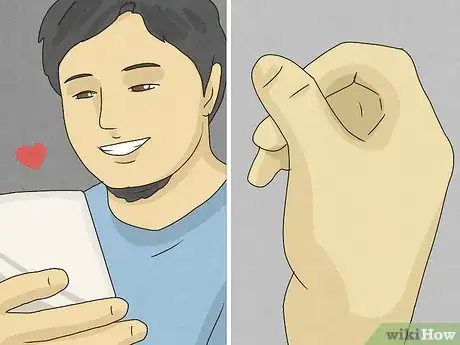


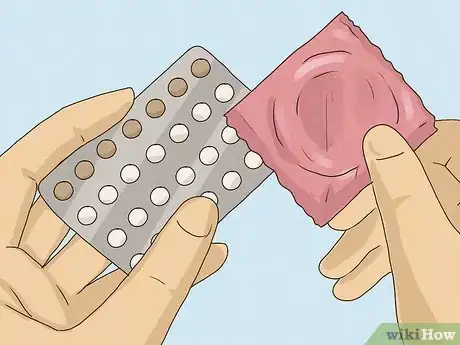

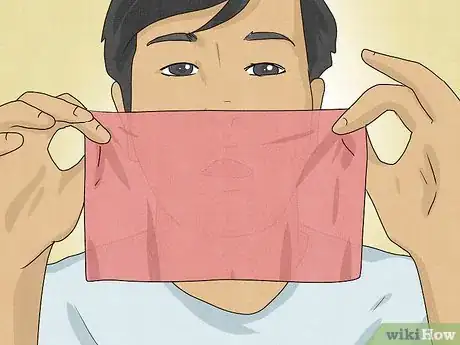

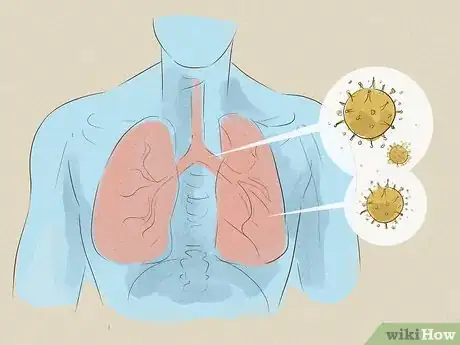


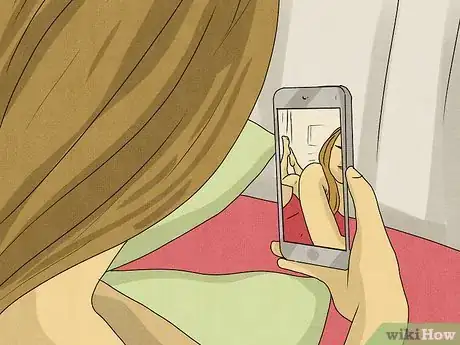
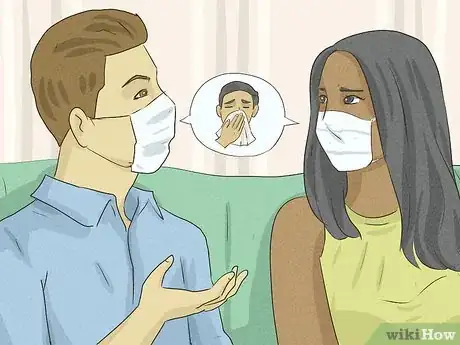

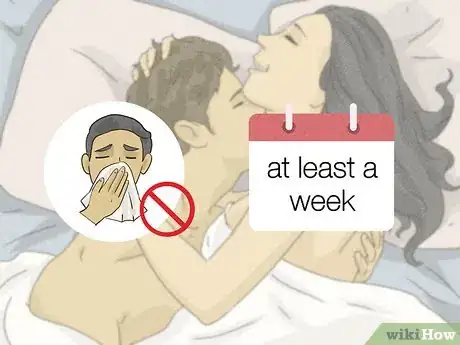
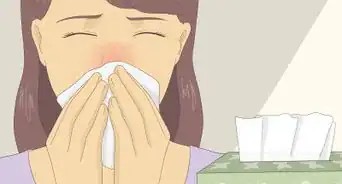

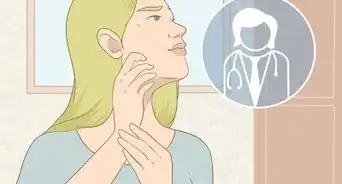
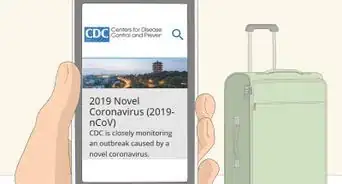













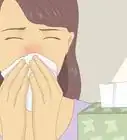

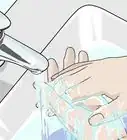




































Medical Disclaimer
The content of this article is not intended to be a substitute for professional medical advice, examination, diagnosis, or treatment. You should always contact your doctor or other qualified healthcare professional before starting, changing, or stopping any kind of health treatment.
Read More...